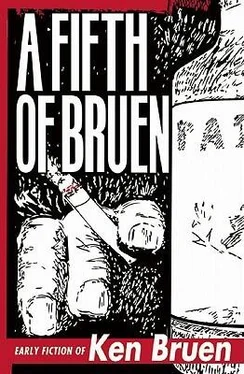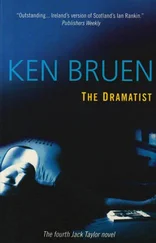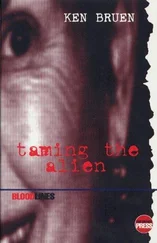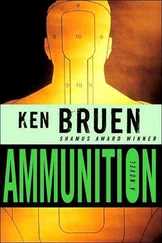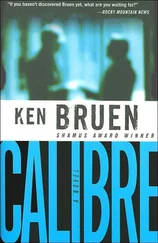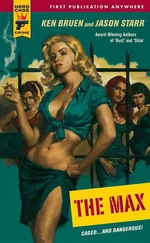“Job.”
“Yea, that’s the guy. Always whinin’ to heaven, ‘Oh oh oh, why me, Lord?’” The Lord looked down and said, “Cos you really piss me off.”
Ford laughed loudly, but Dalton wasn’t placated.
“You keep laughing, son, it’s what you do best. The end is nigh, and nigher than you think.”
Dalton gulped down the dregs of his whiskey. Standing up, he looked Ford full in the face and said, “How yah fixed for a tenner?”
The briefest conversation.
Ford boarded the No. 12 at Notting Hill Gate. Not a riot in sight. The upper deck was packed but he managed to squeeze a space in front of two very well dressed women. In their fifties, he noted without interest. As the bus turned at Marble Arch he gradually filtered their conversation. He tried these days to shut out others’ talk. Vikki had once accused him of being but an eavesdropper on life. “Fit that into a C.V.,” he’d replied.
One woman said, “Well, I said to him, ‘Trevor, you may certainly suit yourself, but I’m not wearing a bra.’”
“Gosh, I’ll bet that set the cat among the old pigeons. What!” I’d have told him I hadn’t worn an knickers there either, Ford thought. Louis MacNeice was among Ford’s favorite poets. Not least because he loved trains. Ford could sit and read Autumn Journal and know a measure of peace. He’d like to carve in granite MacNeice’s description of the Irish:
“They stagger round the world with a stammer
and a brogue and a faggot of useless memories”
Paul Theroux too, those magical travel books, he was brilliantly crabby. You’d like to sit down with the guy and discuss serious irritation. His novel, My Secret Life , appeared to Ford to have been gouged from his very soul.
Ford liked the English, often despite themselves. That low key approach was mighty appealing. At their best they looked like they’d settle for a good thick rope. Absolute delight was expressed as super . “How was it for you, dear?” “Super.”
The old stiff upper dick was Dalton’s analysis. Thus we come to Bill. He didn’t fit the stereotype. A cockney, he’d been referred to a social worker through the courts. Bill liked to drink. A lot. “Clients,” Neville called them. Bill and Ford became friends. Last Christmas, Ford had given him Paul Theroux’s impressions of the English, The Kingdom By the Sea .
“So, Bill, how did you like the book?”
“Wanker!”
As to whether this meant Ford of Theroux wasn’t clear. They drank together, and recently Ford had fallen down a lot. Some insane part of him hoped Bill hadn’t noticed. That lying prone was, perhaps, an odd way to behave in pubs, but not anything serious. So you had a few, and fell over, big deal. If Bill fell over a lot, would he mind?
As a social worker, he might inject a cautionary word. Very cautionary. Bill was six feet three and tipping two hundred pounds. No, nothing heavy or, God forbid, even mildly castigating.
Bill had asked Ford to meet him in Camden Town, an Irish suburb. They settled in the snug, and went to work on some Guinness. Ford got the next shout and, apparently as an afterthought, ordered a couple of scotches. Bill frowned.
“The Guinness tastes a bit sour?” asked Ford.
“Not the Guinness.”
In such a situation you either shut up or asked, “Not me, I hope.” The latter never paid dividends.
“Not me, I hope.”
“You got that right, son.”
Whoops! This was heading for the toilet.
“What, what’s the matter?”
“Do you worry about your drinking?”
“No.”
“Ever?”
“No.”
“Maybe you should.”
How big was big, so... OK, Bill was huge and so was his mouth.
“Bill, would you like to get right to it? This is like forty questions and I hate all the answers.”
“Ford, I like you. You’re weird for an Irishman, you’re quiet and funny but I worry for you. Take me, I’m a big drinker. I drink and I do other things. Now, you. You drink and you drink and you fall over every time I see you.”
Ford was raging. A deep surge of bile threatened to blast upwards.
“Well, Bill, where I grew up you suspected people who didn’t drink. Some of the old Hollywood actresses said, ‘Never trust a man who doesn’t drink.’ They could trust me. I kept hearing about role reversal on TV. Is that what we’ve got here? You’re the social worker and I’m the big guy with the market stall, oh yea, and a drink problem, right?”
Bill tried to interrupt. He’d never heard Ford say so much. Neither had Ford. The look on Ford’s face was chilling.
“Shut-up! You want honesty, then shut the hell up.”
“I have a drink problem, it’s my problem. You have a problem with that, it’s your bloody problem . But, see, already your talk has helped. See these drinks — see! Who the hell needs them!
He was far too Irish to sweep them to the floor. He stood and swept out.
Ford liked to read about Paris in the Thirties, all the heavy-weights floating around dripping literature. The lost generation, how unutterably romantic. It tickled him to think that in fact a garage mechanic had coined the phrase. Gertrude Stein claimed it like the slick old bat she was. Personally, Ford felt he belonged to “the faded generation.” “Wow, how did you get those dreams so faded?” “Stone wash... then hung them out to dry.”
He read about Paris now to block out the scene in Camden Town. It didn’t work. Whether Hemingway wrote one true sentence or Alice B. Tok told the truth in her woeful biography, who cared?
Crossing to his one cupboard, he rummaged there. Out came a bottle of Pernod, unopened, the seal intact. A present from Vikki after one of her Parisian jaunts. “Open that on a special occasion,” she said. Her eyes had been as soft then as if the whole world had benefited from a belt or two of Pernod. He put Waylon Jennings on the turntable. The bottle he placed on the table before him. Hands clasped, as if in prayer, he sat watching it. Waylon sang.
Hemingway said in A Moveable Feast that at his happiest time with Hedley, they’d been in an oak cabin surrounded by wood. They hadn’t touched or knocked on it, and how Hemingway rued that omission! Ford was damned if he’d touch wood either. The question was straightforward: “Was this, or was it not, the special occasion?”
Come Thursday night, Ford replayed his scene with a client at work. A middle aged travel agent was developing a taste for drink. Pressure from his wife led him to seek help or, as she said, “She’d travel.” The initial interview had gone like this. Tom, the travel agent, was extremely nervy.
“Do you worry about your drinking?” Ford asked.
“No!”
“Ever?”
“No.”
“Maybe you should,” said Ford with the air of solemn experience.
He fixed Camden Town squarely in his sights, then continued.
“Tom — May I call you Tom? OK, Tommy. I like you, you’re offbeat for a travel agent. You’re quiet and, probably, funny. I worry for you, Lots of people drink, am I right, Tommy? Just nod your head. They drink and do other things. But you Tommy, you drink and you drink, and you fall down.”
“I beg your pardon? I never fell down in my life,” Tommy blubbered. “Never!”
“Ah Tommy, you look like a faller to me. No, no, no, Tommy, just nod. It’s best at the beginning if you don’t interrupt.”
To Ford’s amazement, Tommy took all of this for the mandatory two hours. Ford would have walloped the living daylights out of himself. Especially the “Tommy” touch. Phew! Perhaps travel agents were immune to abuse. Afterwards, in Neville’s office he’d been introduced to Tom’s wife. A harridan, as the dramatists said.
Читать дальше
